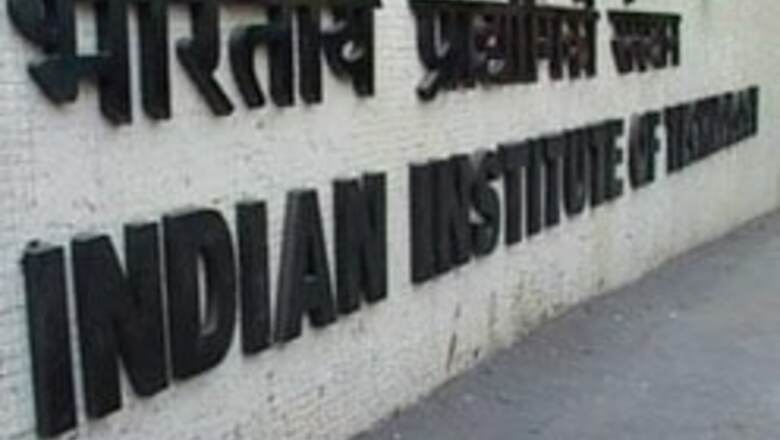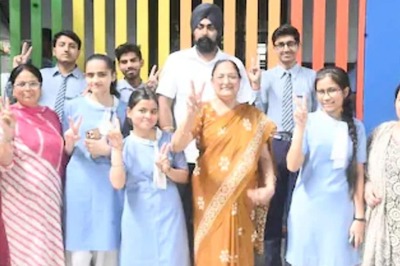
views
Mumbai: They are corporate honchos, technologists, engineers, editors, politicians, major players in Silicon Valley, but in their core lies the good old 'IITian'.
Half a century after the Indian Institutes of Technology (IITs) were launched, their alumni came together at IIT-Bombay to look back at their achievements - and shortcomings.
"They were built to create leaders, more than just engineers or technocrats," said IITian Sandipan Deb, now editor of the Financial Express and author of the book "The IITians".
Deb pointed out that IITians had succeeded in a broad number of fields. "From Wall Street to filmmaking, from the NGO sector to software sector, "while not moving away from what was thought as engineering being "a way of thinking, a way of life".
Deb said his shift to journalism had drawn very intense family opposition but added: "The confidence that IIT education gives you stands you in good stead."
The IITs are a set of premier technology institutes in India located at Kharagpur, Mumbai, Chennai, New Delhi, Kanpur, Guwahati and Roorkee.
Some IITs were established with financial assistance and technical expertise from Unesco, Germany, the US and the former Soviet Union. The first came up at Kharagpur, near Kolkata, in 1951.
"During my time, the Indian government and public sector undertakings were very attractive institutions to join. (The military-related) DRDO was just taking shape. So were the steel plants. We were in the process of building infrastructure and capabilities," commented the scientific adviser to the defence minister and an IITian, M Natarajan.
So, is it a twist of irony that the products of socialist planning and post-independence dreams of self-dependence in technology have now become the uber-capitalists of Silicon Valley?
"Forty percent of Silicon Valley start-ups have an Indian founder. We are moving the world ahead and then looking at contributing back to India," said Webaroo.com founder Rakesh Mathur.
Said the founder of software tiger Mastek, Ashank Desai, which has been in the news for its innovative solutions even with the traffic system in London: "We were pretty much more naive in terms of what job opportunities we would see for ourselves. I didn't even dream we would start an IT company one day."
Founder-president of the Lok Paritrana political party, Tanmay Rajpurohit, said: "I graduated in the 21st century (2001). When I entered, I thought of R&D (as a solution). Then it made me think. India's not lacking in human resources. We're lacking in intellectual statesmanship even 50 years after independence."
PAGE_BREAK
Rajpurohit, however, added as an aside that his decision to join politics after IIT had led him to be "disowned".
IIT-Bombay director Ashok Mishra argued that the "IIT brand" was being built even in the 1970s, when he was a student.
"In the early days, when you graduated, you worried whether you'd get a job or not. Now before you graduate, you have two to three jobs in your pockets. You had scholarships to go abroad...but with the economy booming now, it's different," said Mishra.
"Whether they're in R&D, education, research or management or entrepreneurship, IITians excel. I see IITians going into entrepreneurship more and more. R&D is now getting converted into technology incubation. When you see peers who have started and excelled, your confidence level goes up too," he said.
But beyond the gloss, there were concerns too.
There's a shortage of 150,000 scientists in India, noted Mishra.
Natarajan pointed to fields like space and atomic energy where "India has a lot of catching-up to do" and also the need for more IITian skills there.
Beyond the "brain drain" and experts going overseas, there was also the issue of the bulk of IITians going into highly paying software fields. "Who's going to make our steel?" asked Deb.
Deb noted that collectively, India's IITs were producing just 4,500 top engineers each year, a miniscule figure for a country of one billion plus.
IITs have faced other criticism too such as charges that they encourage brain drain and their stringent entrance examinations encourage coaching colleges and skew the socio-economic profile of the student.
Some pointed to insufficient representation of women and the disadvantaged, others stressed the need for "100 more IITs in India", and yet others said students and alumni should take on more responsibilities financially.




















Comments
0 comment